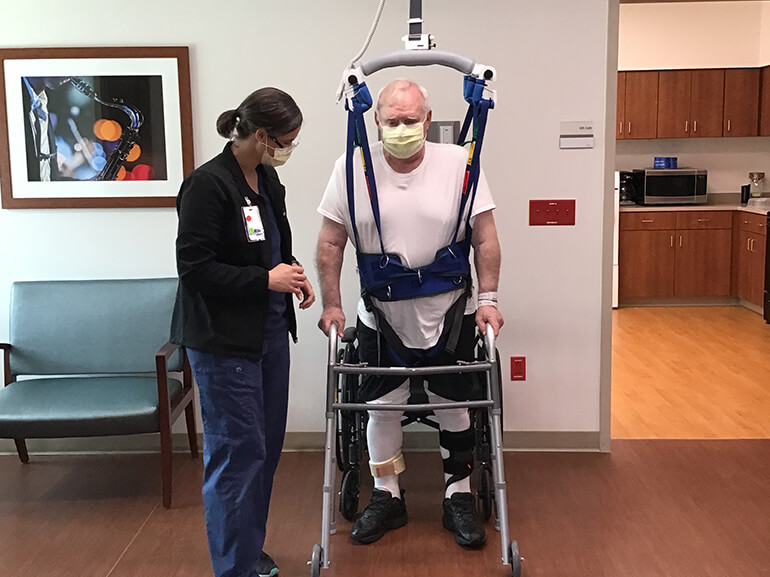Henry's Story

One day, 77-year-old Henry Gilley couldn’t feel his feet and started losing his balance. The retired commercial banker and married father of four went to Slidell Memorial hospital where he was diagnosed with Guillain-Barre syndrome. Prior to his diagnosis, his family was very active, and he wanted to get back to that. To help him get there, Henry received five days of immunoglobulin treatment at Slidell Memorial Hospital to allay the progression of the Guillain-Barre. After completion of his treatment, doctors recommended further inpatient rehabilitation.
Henry had options for his rehabilitation, but he chose Northshore Rehabilitation Hospital because it was highly recommended by both his primary care and other physicians working with him.
Henry arrived at Northshore Rehabilitation Hospital on April 29, with no balance or feeling in his lower extremities, and he could not get out of bed on his own. His main goal was to improve his mobility so he could take care of himself – getting out of bed, using the bathroom independently, brushing his teeth, putting on his shoes.
Occupational therapists focused on daily living activities. He had significant weakness and poor endurance due to his condition, and he needed full assistance with self-care tasks. Henry’s therapists had him participate in daily upper extremity exercises to improve his strength and endurance. They also taught him new techniques and practiced functional skills required for bathing, dressing and toileting. Over time, he improved, only requiring supervision for self-care tasks.
In physical therapy, Henry focused on standing with a goal of walking independently. When he arrived at the rehabilitation hospital, two people had to lift and place him in a harness because his legs were too weak to support his weight. His team worked with him to increase his leg strength and relearn how to walk. They also taught him to rely on his arms for support while standing and how to monitor his fatigue levels. Over time, Henry increased his strength and progressed to using a walker, then a safety harness which helped him relearn to walk without holding onto anything.
Henry said his therapy team encouraged him and kept his wife updated daily. “The people, service and knowledge are outstanding,” he said. “Not only do they work with you physically, but mentally. They help you adjust to the condition that you’re in. And that is one of the strong things that I have felt since I was here. I appreciate everything that every one of the staff have done for me and my family.” While his family couldn’t visit due to COVID-19 restrictions, he said he still felt their support and knew it would continue once he returned home.
After three weeks in the rehabilitation hospital, Henry was ready to go home. He was looking forward to spending time with his family and getting back to the activities they enjoyed before his illness. He left having achieved his goal of being independent in daily living activities and walking and was grateful for the care he received. “I’ve never been treated in any facility as well as I have in here.”